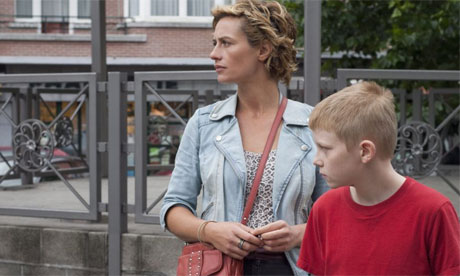The Kid With A Bike

Watching this simple yet riveting Belgian film, I noticed that I hadn't sat with such a rapt audience in some time. I think it's because it's told with such tremendous urgency by the Dardenne brothers, Jean-Pierre and Luc. There isn't a dead scene in it. As much as any thriller, it keeps your adrenaline pumping.
It's a little story about forgiveness and a young boy, Cyril (Thomas Doret). Already ditched by his father (Jeremie Renier from "L'Enfant") in a boarding school, he refuses to believe it when the man simply disappears one day. He argues to school officers that surely his dad would have at least left behind his cherished bicycle, the one thing in the world that he can call his own, that gives him some sense of agency and freedom.
Fleeing from those officials, he plunges blindly into a doctor's waiting room in his old neighborhood and literally pulls a woman, Samantha (Cecile De France) into the frame--and into the film, and into his life--with a crash. As the men try to pry him loose, he clasps to her for dear life. The woman's response is telling. She does not try to wrench herself free. She is not particularly ruffled. She merely says this: You can hold me, just not so tightly.
She takes him in. The Dardennes have a good feel for life--work and play--in this working-class "estate" (neighborhood). Looking for a father figure, Cyril is taken under the wing of a neighborhood ruffian (Fabrizio Rongione), and we're left waiting for the other shoe to drop.
There is so much pain and shame in not being wanted; as Cyril young Thomas Doret wears a sullen, stubborn frown sheilding a coiled ball of hurt. When it breaks, it lashes startlingly. (There is no score to the film, but that makes the spare bursts of music that break free in these moments--stabs of Beethoven's Emperor concerto--even more striking and expressive.) It is a remarkable performance, raw, natural, reminding us how keenly children feel.
As Samantha, Cecile de France manages to suggest a woman who's had a life that has made her the person we see before us: kind but no pushover, she has a tough core. And yet she is endlessly patient with Cyril. We never do find out why this woman should be so prepared to love and forgive this boy--to love him even when he's impossible to like, even when he hurts her--and yet we believe it every step of the way.
"He never got enough love" is the sarcastic cliche about at-risk youth who end up hurting people. As we watch this boy stumble and flail, we see that there's hard truth behind that oft-mocked sentiment. Cyril has found someone who will accept the love he has to give--and maybe that's all Samantha ever wanted, as well--but it's learning to accept her love that is the hardest thing.
No one shouts about redemption in "The Kid With a Bike". They just get it on with it, rolling forward, letting the past recede behind them.

Rating: ****
--April 17, 2012
Key to ratings:
***** (essential viewing)
**** (excellent)
*** (worth a look)
** (forgettable)
* (rubbish!!)


 Scott Pfeiffer
Scott Pfeiffer